The Lesley MFA Program in Creative Writing opened up new avenues for many of us in exploring ourselves and our writing. WFYP alum Kate Fussner talks about how her mentors encouraged her to start writing in verse, which led to the publication of her upcoming book, The Song of Us. Read on to learn more about her writing journey!
KATE FUSSNER – WRITING FOR YOUNG PEOPLE, JUNE 2021
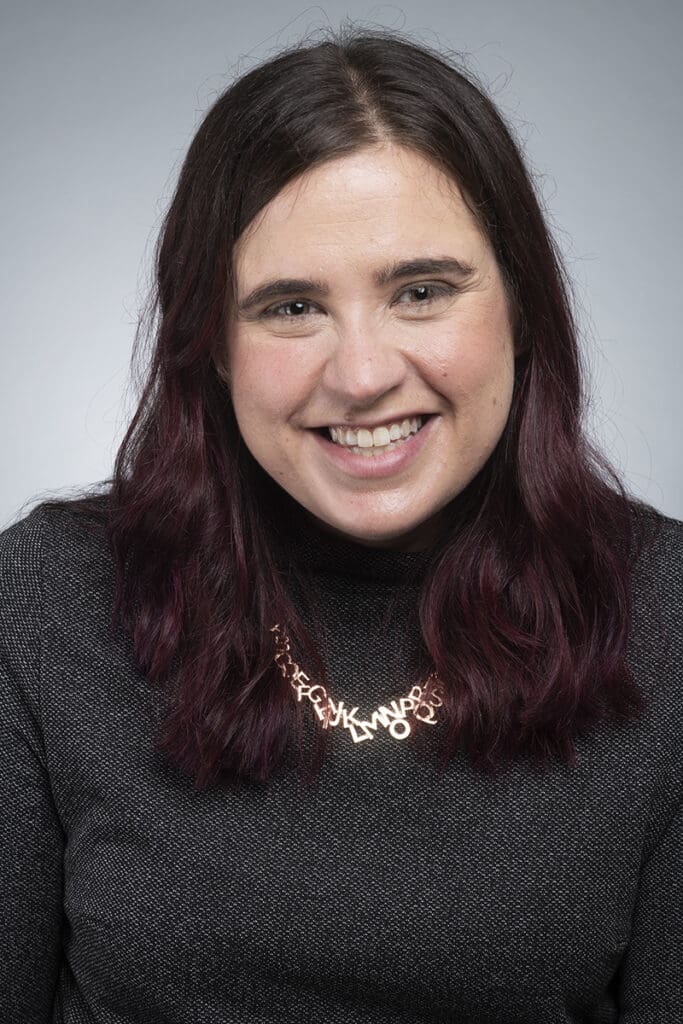
KATE FUSSNER is a novelist, teacher, and accidental poet living in Massachusetts with her wife and dramatic dog. When not reading or writing, Kate can be found baking, spending time with her family, or singing her favorite musicals. Kate believes in the power of a good laugh and a good cry, and hopes her stories will provide readers with both. Her debut novel, The Song of Us, will be published in Summer 2023 by HarperCollins/Katherine Tegen Books. Her writing has appeared in the Boston Globe, WBUR’s Cognoscenti (x , x), and elsewhere.
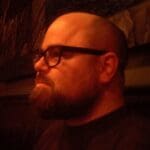
Interviewed By
Michael Mercurio
In your bio on the CCW site you mention that you teach high school English, which seems like a perfectly complementary career for a writer of YA fiction. Which came first for you, the desire to write, or the desire to teach?
I think my earliest desire was to be a reader. I devoured books as a kid, and wondered how I might create a life for myself that was all about reading. By the time I got to high school, I realized that I could spend my life reading the most number of books if I became an English teacher and writer. I was lucky enough as a teen to have fantastic, talented, openly queer, joyful English teachers who modeled for me great teaching and lit a fire in me to tell my own stories. While I no longer teach, I learned from my students that there was a great boom in the publishing industry for high-quality MG and YA literature, and a great need for it that was finally being fulfilled.
Thanks for sharing that anecdote about your own openly queer & joyful English teachers, and how having such support and encouragement helped affirm your own trajectory. And it’s interesting to know that your own students also influenced your understanding of the MG and YA landscape!
You’re represented by an agent — that’s incredibly exciting! It’s also baffling to a poet like me. Would you tell us a little bit about what the relationship with an agent is like?
My agent, Eric Smith at P.S. Literary, is a dream agent for me. He’s deeply knowledgeable about the industry from both the agenting side and author side. He’s made it clear from the very start that he’s ready to champion my work and that he understands the importance of getting queer books on the shelves. I started querying shortly after I turned in my thesis at Lesley, and cold queried him with my thesis manuscript (along with about 10 other agents). I knew from my first phone call with Eric that his energy, kindness, and joy for my writing meant that he was the right person to represent me. I signed with him right before my graduation from Lesley, and shortly after we began submitting my work to editors. In the fall of 2021, we received a couple offers and I signed a two-book deal with HarperCollins/Katherine Tegen books to publish two middle grade books. My first book, which was my thesis, The Song of Us, will be published in Summer 2023. A queer novel-in-verse, The Song of Us is a modern day adaptation of the Greek myth “Orpheus and Eurydice” starring two seventh grade girls destined to love and lose each other as they learn to love themselves. My second book will follow in Summer 2024.
The Song Of Us sounds like it draws together many threads — ancient Greek myth, queerness, the challenges of seventh grade, and the internal psychodrama of finding oneself while trying not to lose someone else — and, on top of that, it’s a novel-in-verse. I hope you don’t mind, but I have a bunch of questions about this.
How did this marvelous assemblage of form and content and theme come about?
The Song Of Us was inspired by a challenge from my mentor, Tracey Baptiste. At the end of my semester working with her, as I geared up for my third residency, Tracey’s final challenge to me was to take a break from the novel I’d drafted during my first two semesters. She insisted I give the book some space to breathe. She wanted all the WFYP students to leave with at least two manuscripts, ideally for different age groups. But I came to Lesley to write YA! And I knew the story I wanted to tell! Why couldn’t I just stick with it? Tracey insisted that I try something new. At first, I was furious. I stomped around my apartment for about forty-five minutes (my wife loves this part of the story because I very rarely get mad). But as I settled into a yoga session, I cleared my mind and the idea appeared: Orpheus and Eurydice, but make it queer, middle school, and make sure Eurydice has her own full story. It always frustrated me that Eurydice’s role in the story was to get married and die. Her journey to the Underworld and back also deserved its own story! So I knew I wanted it to be two points of view, two full story arcs, right away. Middle School seemed like the perfect setting for the Underworld, and each girl seemed poised to learn lessons about loving others and loving themselves throughout the journey.
HA! That’s an incredible story, and it sounds like Tracey knew exactly what she was doing with that challenge, even if she didn’t know exactly what was waiting to emerge after a good stomp-around and some yoga. Have you found ways to continue the practice of challenging yourself after Lesley, or do you miss the mentor/mentee relationship?
Of course I miss my mentor/mentee relationship with the Lesley faculty! The Lesley WFYP faculty are some of the best writer-teachers I have ever worked with. As a former teacher, I know that great writers don’t always make great teachers, but I did not feel this way ever about the WFYP faculty. Their mentorship and teaching were invaluable. By virtue of signing a two-book deal, I have found my new challenge: writing under contract. I am grateful to have an agent and editor, both of whom are generous with their time and knowledge, to guide me through this next stage of my writing career. In addition to working on my novels, I spend time learning about the industry and applying for additional grant funding so that I can continue this full-time writing life as much as possible. Thanks to an unannounced grant, I will spend the next year working on additional writing projects. I have found an incredible KidLit writing group that supports and challenges me to keep pushing myself as a writer. I encourage everyone after Lesley to find their writing community that helps fuel them!
Are there half-finished prose drafts that just didn’t click, or was it always going to be in verse?
Amazingly, I also knew right away I wanted the story to be in verse. I can’t explain it, because I had never seriously written poetry before. But every draft, from the beginning, was in verse. I had a lot to learn about how to craft my earliest draft into actual poetry, but my time working with Jason Reynolds completely transformed how I think about writing. Jason taught me that so much about poetry is about playing with and loving words. When I could see that that was the work, I knew it was the right direction for this story and for my writing. I like to think of myself as an accidental poet. I never set out to write poetry, but now that I have been writing verse-novels, I feel like I’ve found I’m at home in poetry in a way I never expected.
Did you do much research to inform the book? If so, how and where did you do the research?
Along with reading several versions of Orpheus and Eurydice, I read a lot of poetry with a new purpose. I wanted to figure out how verse novelists world-build and create the more traditional aspects of novels; I needed to understand how setting, personality traits, dialogue, and character development could be communicated through poetry without weighing the poems down. I wanted to make sure that every single poem could stand as a poem and further the plot. This required reading a lot of verse novels to figure out what made the stories move forward and made the poetry sing.
In addition to your YA writing, you’ve published several pieces in WBUR’s Cognoscenti, including a tremendously funny one about becoming a Masshole. Where are you from originally, and have you always written short-form humorous pieces, or is that something more recent?
I was born in Philadelphia and grew up on both sides of the Delaware River, first in South Jersey and then in Narberth, PA. My first love as a writer was personal essays, both humorous and serious, and that was my main focus as a writer until my late twenties. All of my college writing classes were for narrative nonfiction, and I was lucky enough to study with Kiese Laymon and Paul Russell. They taught me a lot about telling truth and writing queer stories. As a full-time teacher, I didn’t have a ton of time to write; writing and publishing personal essays became a good way to build my habits as a writer. I took classes at GrubStreet and spent part of one summer at Kenyon College, studying flash nonfiction with Dinty Moore of Brevity. I didn’t start seriously considering writing fiction and writing for young people until I had my first idea for a YA novel in 2017.
I admire your tenacity in terms of pursuing writing throughout your life, and I’m impressed with the fluency with which you work across genres. Since one of the strengths of the Lesley program is its interdisciplinarity, I’d love to hear about any experiences you had where a non-genre seminar or an interdisciplinary studies course helped you refine your thinking about your own writing.
Lesley’s interdisciplinary program allowed me to continue to explore my interests across genres while refining my skills in writing for young people. Each of my I.S. programs (Intro to Graphic Novels, an editorial assistantship with Brevity flash nonfiction literary magazine, and Pitch Perfect) deepened my understanding of writing and inspired me to continue experimenting. Intro to Graphic Novels taught me about the incredible relationship between words and images, and taught me to try out forms even when I worry I might not be “good” at them. I left my creative comfort zone and learned that creative risks can be rewarding. Although Intro to Graphic Novels only focused on GN, I think the fact that I tried something so outside my comfort zone gave me the courage to try verse novels, too.
My decision to take Pitch Perfect came from my interest in wanting to understand more about the publishing industry and how to position a story in the market. I knew nothing about querying, and my goal was to leave the program ready to query a manuscript. What I found in Pitch Perfect was much more than industry knowledge: I came to know The Song of Us even better than when I began the course. The course helped me refine my story for others and for myself. By the end of the course, I felt confident that I had the clearest explanations and strongest queries ready to go for agents to see. In the end, it is the query materials that I wrote in Pitch Perfect that helped land me my agent.
You certainly knew how to choose your IS courses! It sounds like they complemented your creative and professional development in the program, and I’m fascinated by your experience with Pitch Perfect. It makes total sense that the course would walk you through looking at The Song of Us from a different perspective, but I wouldn’t have realized it before you said it.
As a poet myself, it makes me very happy to know that Jason was able to guide you into the practice of poetry. There’s a lot of mystique about it, and poets are very often guilty of inflating that mystique, but it really is a love of playing with words. Do you think you’ll write more verse-novels, or try your hand at free-standing poems?
At the moment, I am working on a second middle grade verse novel. I have not yet tried my hand at free-standing poems. But if there’s anything I learned from my time at Lesley, it’s that I should not stop myself from trying something new as a writer. Leaving my comfort zone seems to be the best way to grow.
The more you talk about your book, the more eager I am to read it! It also sounds like you could turn your research and expertise into a seminar — or a workshop series! Do you think you’d like to return to teaching someday in some capacity, even if not back at the high school level?
I would love to teach again, perhaps in a workshop series for teens or adults, or at the undergrad/graduate level. Eventually I would love to teach in a program like Lesley’s, because I think my experience as a teacher has prepared me for both seminar-style and mentorship-style teaching. This semester, I’m serving as a mentor for an un-agented writer in the Diverse Voices Mentorship program. I am working with one student closely as she revises her verse-novel and prepares the materials necessary for querying. I love sharing what I have learned with others, and hope that this mentorship is the first of many opportunities to help pave the way for new voices in publishing.
Will you be doing a book tour for The Song of Us? If you come to Western MA I’ll bring everyone I know to the reading…
I will definitely do a book tour when The Song of Us releases in 2023, hopefully with launches in both Boston and Philadelphia (where I’m originally from). I’m not opposed to Western, MA but I will strategically plan where to go based on where I know I can easily connect with readers and spread the word about my book!
Listen to Kate read an excerpt from her upcoming book, The Song of Us.

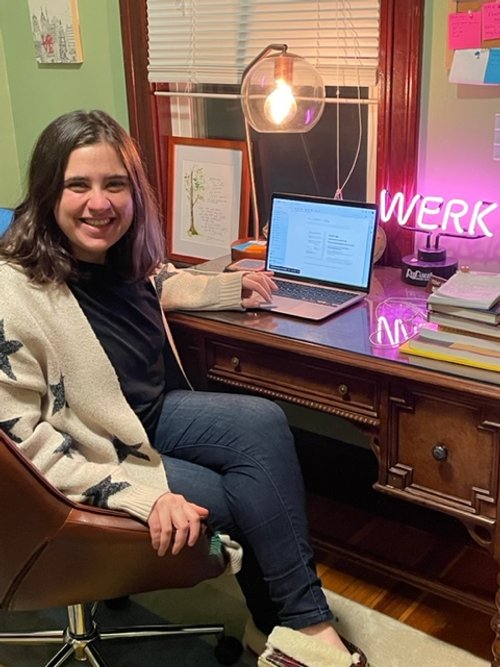
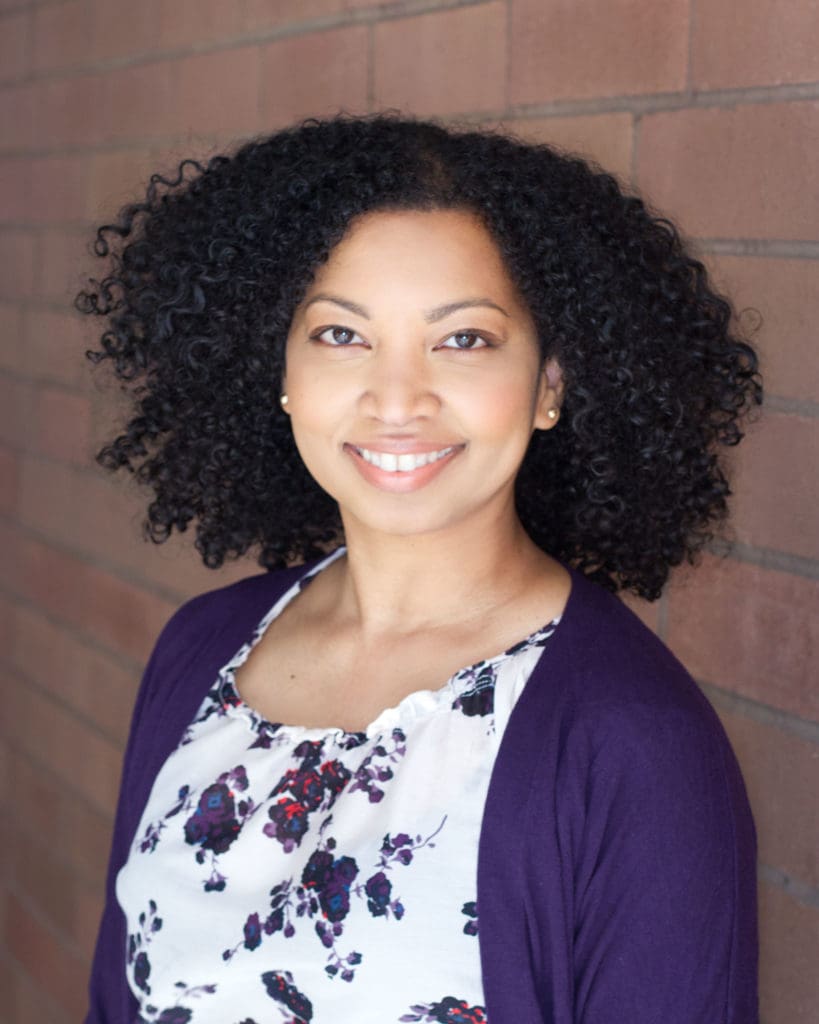
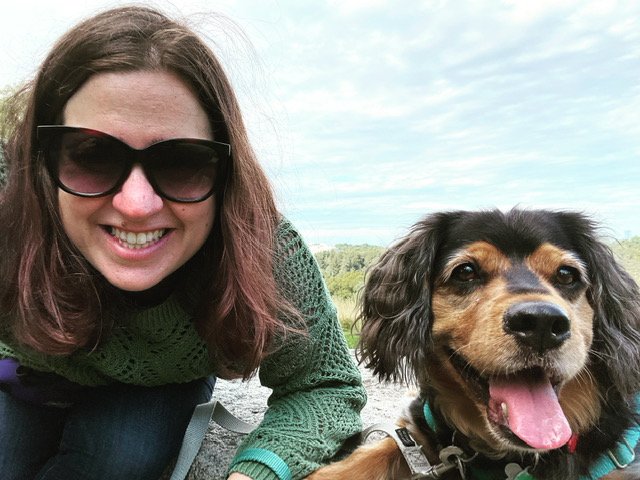
Comments are closed